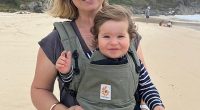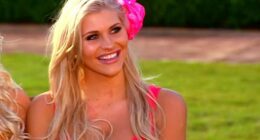Exclusive: James Wright’s daughter lights up whenever ABC juggernaut Bluey appears on the TV.
Wright’s baby girl was born profoundly deaf and while she enjoys the bright colours of her favourite TV show, Bluey isn’t available in Australian sign language, also known as Auslan – the shared language of the deaf community.

It has prompted him, and more than 13,000 others, to issue a public plea to our national broadcaster and the creators of Bluey: please translate the beloved show into Auslan.
“My daughter is an extraordinary little one-year-old who was born profoundly deaf in both ears,” the Melbourne father told 9news.com.au.
“We don’t know why, but it’s a special part of who she is.
“She’s an exceptionally bright, friendly little girl and Auslan is her first language.
“Being the youngest of our three kids, we just want her to be able to enjoy the same great Aussie content her siblings do.”
As hearing parents, Wright and his wife have witnessed and learned so much in the past 12 months after welcoming their daughter.
They’ve seen the world through the lens of a deaf toddler and it’s certainly been eye-opening.
The family has learned sign language to communicate with her and, in their quest to find content she can enjoy, they have hit a brick wall.

“Her unique way of experiencing the world around her is kind of inspiring everything we do as a family, including launching this petition to make kids TV more accessible,” he said.
“There is a serious lack of TV content options for my daughter and kids like her who rely on Auslan interpretation… Sadly none of the popular kids’ shows are available in Auslan.
Bluey has become a worldwide phenomenon and is dubbed into more than 20 languages, including Blæja in Iceland.
It’s also available in American sign language for a US audience.
The show featured Auslan in one episode titled Turtleboy, which involved a character named Dougie using sign language.
Queensland-based Ludo Studio, which produces Bluey, said it collaborated with consultants from Deaf Connect to bring the inclusive episode to life.
ABC Kids also aired a TV show, Sally & Possum, which was funded by the Queensland government and used Auslan for deaf and hard-of-hearing children.

It was incredibly meaningful to the Wright family to see this – but it’s not enough.
“It’s nice to see representation taken seriously, and Turtleboy is one of our favourite episodes, but it’s really unacceptable that out of 154 episodes of Bluey, there’s only one that Aussie deaf kids can fully enjoy,” he added.
There are five children’s shows with Auslan-interpreted content available on the ABC.
According to the 2021 Census, more than 16,000 people use Auslan at home in Australia.
For many, it’s their only way to communicate.
There are also many non–verbal autistic children who use sign language as their main form of communication, Wright said.
“Deaf kids start learning sign language from the moment they are born, but they can’t read closed captions on TV until around the age of six,” he said.
“These are the prime years where kids’ communication and social skills develop.
“It’s no wonder deaf children often struggle with language and emotional development, because they just don’t have access to the experiences we all take for granted.
“Depriving deaf children from access to kids TV is discrimination.”

If the petition does not spark action, Wright’s next port of call will be calling on the government to mandate minimum standards for Auslan translation of ABC children’s content like Bluey and Playschool.
“There is an urgent need for Auslan to be a leading accessibility priority in this country,” he said.
“Our kids can’t wait any longer.”
So far, it has attracted over 13,200 signatures.
A spokesperson for the ABC said the broadcaster has increased its efforts in recent years to make its content more accessible and is working to apply Auslan to more ABC Kids programmes.
The ABC’s statement in full
The ABC has met with Mr Wright and we are grateful to him for taking the time to discuss this important issue with us.
In recent years, the ABC has increased our efforts to make our content more accessible. In 2023/24, the ABC main channel broadcast an average of 6570 hours of programming, all with closed captioning.
Closed captioning is also available on most programs on ABC iview including children’s programming. ABC News produce a weekly news bulletin with Auslan interpretation.
Play School, Emma, ABC Education Story Time and Bluey all have episodes featuring Auslan and Sally & Possum is an Australian program developed for deaf and hearing-impaired children utilising Auslan.
We are currently investigating opportunities to apply Auslan to a number of ABC Kids programs on an ongoing basis.
This work is in the early stages and we look forward to working with the relevant groups and providers as this work progresses.
9news.com.au has contacted Ludo Studio for comment.







